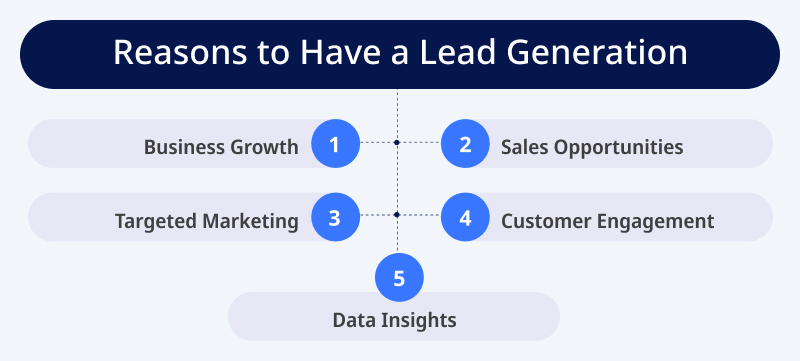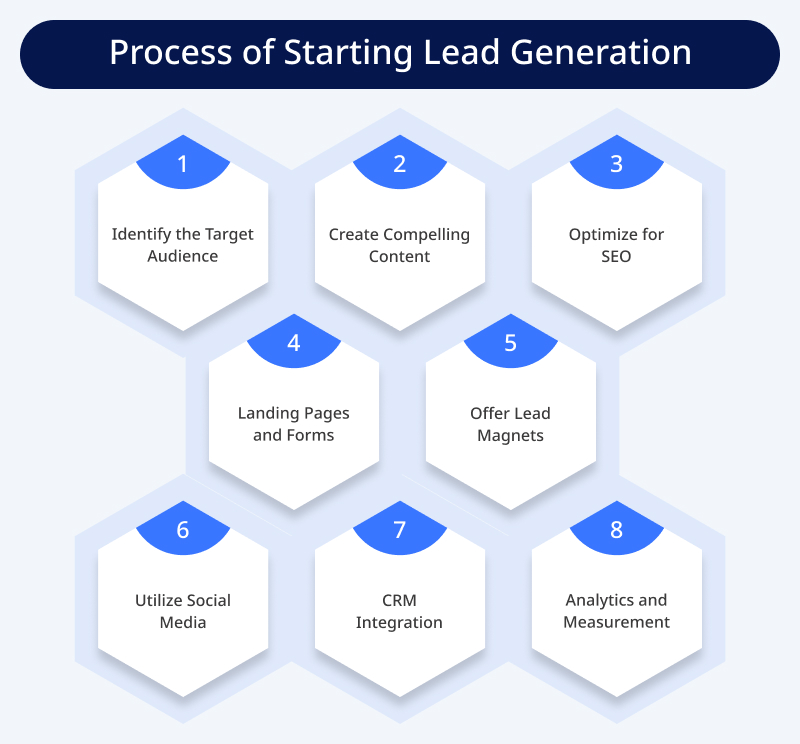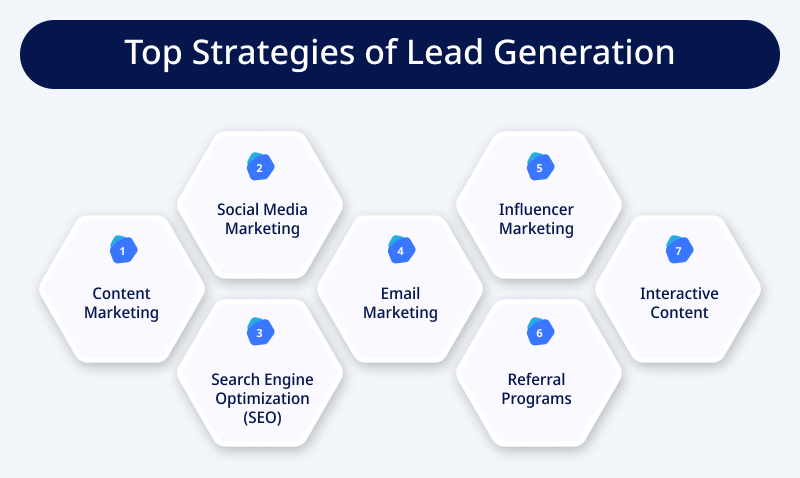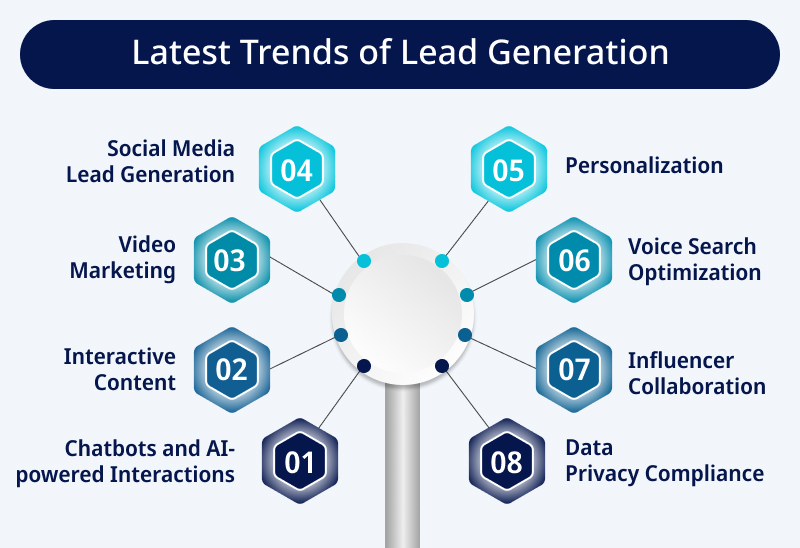Need help generating leads for your business? You’re not alone. In today’s competitive market, standing out and attracting new customers can be challenging.
What businesses need is a steady flow of leads, which traditional methods like cold calling and door-to-door sales might not fail to deliver in a short time span.
That’s where our blog post Inbound Lead Generation 101 can provide you with the tools and strategies you need to attract and convert leads without the hassle of traditional sales tactics.
Read on our step-by-step approach to generate leads quickly and watch your business grow like never before.
Key Takeaways
We are going to discuss:
- What is Lead Generation?
- Why do You Need Lead Generation?
- Steps of the Lead Generation Process
- Lead Generation Strategies
- Latest Lead Generation Trends
- How can PixelCrayons help in Lead Generation?
Table of Contents
What is Lead Generation?
Business lead generation identifies and attracts potential customers (leads) for a business’s products or services. It involves picking consumer interest and gathering data that enables companies to nurture leads and turn them into clients.
A key component of lead generation marketing strategy, which frequently entails various techniques and avenues to pique the interest and awareness of the target market.
Key Components of Lead Generation:
- Identification of Target Audience
- Creating Awareness
- Offering Value Proposition
- Capturing Contact Information
- Lead Nurturing
- Conversion
Why do you need Lead Generation?
Effective business lead generation is the foundation for long-term growth and higher profits. These are the main justifications for why inbound marketing lead generation is essential:
Business Growth: Lead for business creation is essential for sustained business growth. A company can grow its clientele and earnings by steadily drawing in and turning leads into paying clients.
Adding new clients helps the business expand overall, opening up new markets and giving it a stronger position in the sector.
A healthy pipeline is maintained by the constant flow of leads, which supplies the energy required for long-term success, continued corporate growth, and a larger market share.
Sales Opportunities: Business lead generation is the lifeline of sales opportunities. Each lead is a prospective client interested in the given goods or services.
These leads are where the sales process begins and offer great chances to interact, develop, and turn them into paying clients. A company’s sales force has access to a larger pool of prospects the more qualified leads it produces.
The number of sales opportunities increases the likelihood of closing deals, hitting revenue goals, and succeeding in sales. To put it simply, successful lead generation strategies increase the amount of sales opportunities, which in turn drives total business success.
Targeted Marketing: Business lead generation is crucial for achieving targeted marketing efforts. Instead of using the same approach, businesses can use lead generation strategies to target and engage with a specific demographic more likely to be interested in their goods or services.
Businesses can ensure relevance and resonance in their marketing messages and campaigns by tailoring them based on understanding potential clients’ traits, preferences, and behaviors.
This focused strategy increases the likelihood that leads will become customers while improving the effectiveness of marketing campaigns.
Customer Engagement: Inbound marketing lead creation is essential to encourage consumer interaction throughout the buyer’s journey. Companies may start deep conversations with prospective clients by acquiring leads at several touchpoints.
Beyond raising awareness, this interaction involves providing leads with fast answers to their requests, relevant material, and tailored communication.
Good lead generation strategies ensure companies maintain contact with their audience, offering insightful content and fostering connections that result in loyalty and trust.
When used to engage customers, inbound marketing lead generation enhances the customer experience, influencing buying decisions and building enduring relationships.
Data Insights: Lead creation offers insightful data beyond merely gathering contact details. Organizations can effectively target their audience by gaining information about leads’ preferences, habits, and interactions.
Marketing efforts that are more individualized and focused can be made with the use of this data. Businesses may improve client experiences, offer more customized offers, and hone their strategy by analyzing the data gathered during business inbound lead generation.
It facilitates a more thorough comprehension of the dynamics of the market and aids in the formulation of wise decisions that support the expansion of the company as a whole.
Maximize your business's growth potential with our inbound lead generation expertise. Discuss with us how you can propel your enterprise forward.
Steps of the Lead Generation Process
The difficult process of lead generation entails locating and luring new clients. The important steps are explained below:
1. Identify the Target Audience
Determining the target audience is the most critical initial step in the inbound marketing business lead generation process. It involves identifying and comprehending the traits, inclinations, and practices of the audience most likely to be drawn to your goods or services.
Businesses can target specific groups with their inbound marketing methods by developing thorough buyer personas. With a focused approach, resources are allocated where they are most likely to produce high-quality leads.
Effective marketing messaging requires a solid understanding of the target audience’s needs, motives, and pain areas.
2. Create Compelling Content
After determining the target audience, producing engaging content is the next stage in the inbound lead generation process. Content acts as a link between your company and prospective customers. However, this step may seem difficult to you as a beginner. In this scenario, you can use an online paraphrasing tool. To benefit from a paraphraser, you need to pass your content through it, and the tool will automatically uplift multiple aspects of your content.
It should be interesting, educational, and pertinent to the demands of your readership. It covers articles for your blog, content for social media, ebooks, webinars, and other formats that demonstrate your knowledge and offer value.
In addition to drawing attention, compelling content establishes your brand as an authority in your sector. It motivates potential customers to connect with your brand, subscribe to newsletters, and proceed through the sales funnel.
3. Optimize for SEO
It is essential to optimize for SEO in the inbound marketing lead creation process. It is making your website more visible online to draw in natural traffic.
Your website can get greater search engine rankings by using technical SEO elements, producing high-quality content, and strategically optimizing keywords.
Along with increasing traffic, this enhanced visibility guarantees that the people who visit your website are actively looking for the goods or services you provide, which makes them prospective leads.
4. Landing Pages and Forms
Developing user-friendly forms and customized landing pages is essential to effective business lead generation. Landing pages are specialized websites created to collect visitor data and promote particular actions, such as completing a form.
These pages should have conversion-optimized content, persuasive call-to-action (CTA) buttons, and pertinent images. The forms on these pages should balance gathering enough data for lead qualification with keeping them brief enough not to turn off potential prospects.
To direct visitors through the lead generation marketing strategy funnel and turn them into quality leads, well-designed landing pages and forms are essential.
5. Offer Lead Magnets
Businesses use lead magnets, which are worthwhile incentives they provide to prospective clients in return for their contact details.
These incentives can be through webinars, whitepapers, ebooks, or special discounts, among other things. The secret is to provide content that aligns with the demands and interests of your target.
Businesses can start the inbound lead generation process by enticing prospects to share their contact details by providing attractive lead magnets. These resources draw prospective customers and establish the company as an industry leader.
6. Utilize Social Media
Social media platforms are now effective instruments for generating leads. Businesses can use various platforms to communicate with the target market, disseminate insightful content, and build a brand community.
Additionally, social media offers chances to run targeted ads that generate leads and drive traffic to landing pages. There are many ways to engage with clients on platforms like Facebook, Instagram, LinkedIn, and Twitter.
Contests, surveys, and exciting content are a few ways to draw visitors in and get them to share their contact information, which helps lead generation strategies.
7. CRM Integration
CRM (Customer Relationship Management) integration is crucial in the lead creation process. CRM integration gives companies an all-encompassing picture of client interactions by allowing them to compile important lead data into a single platform.
This interface guarantees that the sales team has access to real-time insights, expedites communication, and automates follow-ups.
Companies may better coordinate their marketing and sales operations through CRM integration, improve teamwork, and increase conversion rates.
8. Analytics and Measurement
Measurement and analytics are essential elements of the business lead-generation process that provide insightful data about the effectiveness of your initiatives.
Businesses may monitor important data like website traffic, click-through rates, and conversion rates by utilizing analytics solutions. This data-driven methodology enables well-informed decision-making, assisting in identifying effective tactics and areas needing optimization
Companies can use ongoing assessment and evaluation to enhance their strategies for generating leads, managing resources efficiently, and adjusting to changing market conditions.
Contact us to elevate your business using inbound lead generation strategies. Take the next step towards sustainable business growth.
Lead Generation Strategies
Effective inbound lead generation is essential for business success in the digital age. Utilizing a variety of strategies can aid in attracting and retaining new clients. Below is a summary of effective lead-generation strategies:
1. Content Marketing
Creating and disseminating worthwhile, timely, and consistent content is the foundation of content marketing, a potent lead generation technique that draws in and engages a target audience.
Businesses may establish themselves as an authority and attract new customers by creating excellent blog posts, articles, ebooks, and other content assets.
In addition to educating and informing, digital marketing services establish credibility and trust, increasing the likelihood of website visitors becoming leads.
2. Social Media Marketing
Social media marketing is crucial for lead generation since it connects with the target audience through well-known social media platforms.
Businesses may create leads from social media sites like Facebook ads management services, Instagram, LinkedIn, and Twitter by strategically posting, engaging, and advertising.
Social media provides a dynamic platform for building connections, disseminating insightful content, and guiding followers to contact forms or landing pages.
Businesses may generate leads by keeping an engaging and active internet presence and guiding them through the conversion funnel.
3. Search Engine Optimization (SEO)
Search Engine Optimization (SEO) is a fundamental lead generation strategy that aims to improve a website’s visibility on search engines like Google.
Businesses can improve their organic search ranks by improving different components such as on-page content, meta tags, and site structure. Increased visibility to prospective clients actively looking for goods or services results from higher rankings.
By guaranteeing that the company shows up prominently in search results and increasing the likelihood that users will click through to the website, SEO helps draw in quality leads.
4. Email Marketing
Email marketing is an important tool for business lead generation. It involves delivering customized and targeted messages to prospective clients or subscribers. It helps businesses to sell items, cultivate leads, offer insightful content, and establish rapport.
Businesses may target particular audience segments with their emails by using segmentation and automation, which raises the possibility that leads will become clients. Email marketing works well for keeping lines of communication open, encouraging brand adherence, and eventually increasing conversions.
5. Influencer Marketing
Influencers are people who have a sizable social media following. Influencer marketing is a potent tactic that corporations use to their advantage. These influencers, frequently celebrities or industry insiders, market a brand’s goods or services to their interested audience.
Through influencers’ reputation and trust, organizations may expand their reach into untapped markets, improve brand awareness, and create leads. Finding influencers whose audience fits the target demographic and whose values coincide with the company is crucial.
6. Referral Programs
Referral programs are a useful tool for generating leads by utilizing the current clientele. Businesses can access a network of potential consumers more likely to convert by offering incentives to existing customers who recommend new clients or leads.
Referral programs can take many shapes; some include rewarding successful referrals with discounts, exclusive access, or other benefits. This tactic makes the lead generation process more natural and reliable by drawing in new leads while also using the confidence that accompanies a recommendation from a happy consumer.
7. Interactive Content
Interactive content has emerged as a powerful lead generation strategy, captivating audiences and encouraging active participation.
Compared to static information, interactive content uses polls, surveys, assessments, and movies to keep consumers interested. In addition to drawing attention, this two-way communication offers insightful data on the interests and actions of users.
For example, an industry trends quiz lets firms determine their prospects’ knowledge levels while educating the audience. Interactive content makes the lead generation process more effective, improving the user experience overall.
Grow your business with Inbound Lead Generation. Let’s discuss how we can transform your business growth strategy.
Latest Lead Generation Trends
It is critical to keep up with the most recent developments in the ever-changing field of lead generation. Given the sophistication and discernment of today’s consumers, a calculated approach is required. Here are the trends reshaping lead generation marketing strategy:
1. Chatbots and AI-powered Interactions
Chatbots and AI-powered interactions have become major changes in inbound lead generation. Businesses increasingly use chatbots to interact with website users, respond to their questions, and help them move through the sales funnel.
Chatbots’ conversational capabilities are improved by AI algorithms, which give prospective leads a customized and instantaneous experience. It simplifies consumer interactions while gathering useful information for deeper analysis of user behavior.
2. Interactive Content
Interactive content is a rising trend in lead generation strategies. Businesses now use interactive components like calculators, polls, surveys, and quizzes instead of static material to engage their audience.
In addition to engaging users, interactive content promotes participation, which improves data collecting and helps to understand consumer preferences better. This pattern indicates a move toward material that appeals to modern customers and is more dynamic and engaging.
3. Video Marketing
Video marketing has become a potent trend in lead generation, drawing viewers in on various media. Businesses increasingly use videos for engaging content, customer testimonials, and product demos.
A dynamic approach to engaging with potential leads is through live videos, webinars, and interactive video material that presents information in an eye-catching and memorable way.
4. Social Media Lead Generation
Social media networks are still important avenues for generating leads with PPC management services. Platforms like Facebook, Instagram, LinkedIn, and Twitter are being carefully used by businesses to engage with their target market.
These platforms offer businesses sophisticated targeting options, sponsored content, and lead generation forms that help them target particular groups and obtain quality leads.
Businesses may effectively nurture and convert leads from these platforms by utilizing social media algorithms and engagement statistics to optimize their strategy further.
5. Personalization
Personalization has been an influential trend in lead generation. Businesses are now customizing their outreach efforts according to individual tastes, behaviors, and demographics rather than using generic, one-size-fits-all techniques.
It involves leveraging data analytics to comprehend consumer preferences and sending communications or material tailored to each potential customer.
Businesses may improve engagement and raise the chance of turning leads into customers by developing a more tailored and pertinent experience.
6. Voice Search Optimization
As voice-activated devices like smart speakers and voice assistants on smartphones grow more common, optimizing for voice search has become an essential trend in lead generation strategies.
Businesses must modify their SEO strategy because users are increasingly at ease conversationally asking questions. It involves using natural language patterns, long-tail keywords, and content creation that speaks to the user’s voice.
Businesses can guarantee that their goods or services are found in this changing market by optimizing for voice search and obtaining leads from consumers who favor speech-based communications.
7. Influencer Collaboration
Using influencers has become a popular practice in the lead-generating industry. Collaborating with influencers who connect with your intended audience can increase the visibility and authority of your brand.
Through genuine endorsements, you can attract attention and potential leads by leveraging influencers’ active followership and integrating them into your lead-generation marketing strategy.
8. Data Privacy Compliance
Adhering to strict compliance requirements has become a critical trend in lead creation as data privacy concerns increase. Companies are making sure that user consent is given priority by concentrating on open and honest data-gathering procedures.
Adherence to laws such as the General Data Protection Regulation (GDPR) protects user data and fosters trust, which is essential for lead nurturing and conversion. This pattern emphasizes how crucial moral and conscientious data handling procedures are to long-term lead generation plans.
How can PixelCrayons help in Lead Generation?
PixelCrayons plays a pivotal role in inbound marketing lead generation through its comprehensive suite of services. Leveraging advanced digital marketing strategies, we optimize websites for search engines (SEO), create engaging content, and implement targeted social media campaigns.
Our expertise in custom software solutions allows us to design and integrate effective Customer Relationship Management (CRM) systems, enhancing lead tracking and management.
Additionally, we excel in creating compelling landing pages, email marketing campaigns, and interactive content that captivates and converts potential leads. Connect with us for our services!
Final Words
Effective inbound lead generation is integral to the sustainable growth of any business. It necessitates careful strategizing, constant monitoring, and unceasing improvements in aligning your business value with your prospects’ expectations.
Understanding the process and effectively employing the right tools are keys to converting visitors into potential leads, nurturing them into happy customers, and fostering loyalty in the long run.
Moreover, connect with our team to make your inbound marketing efforts pave the way to your business growth.








